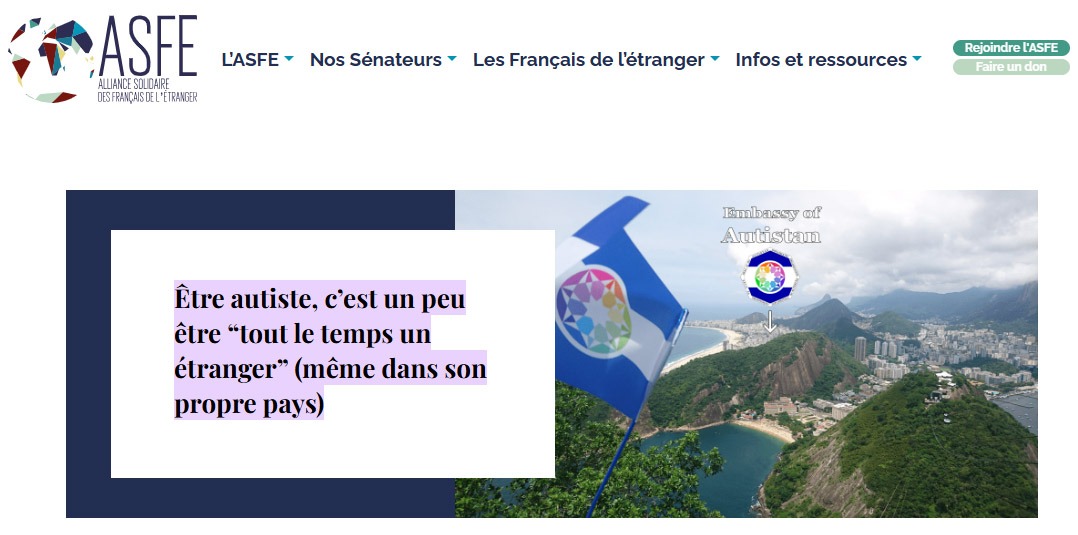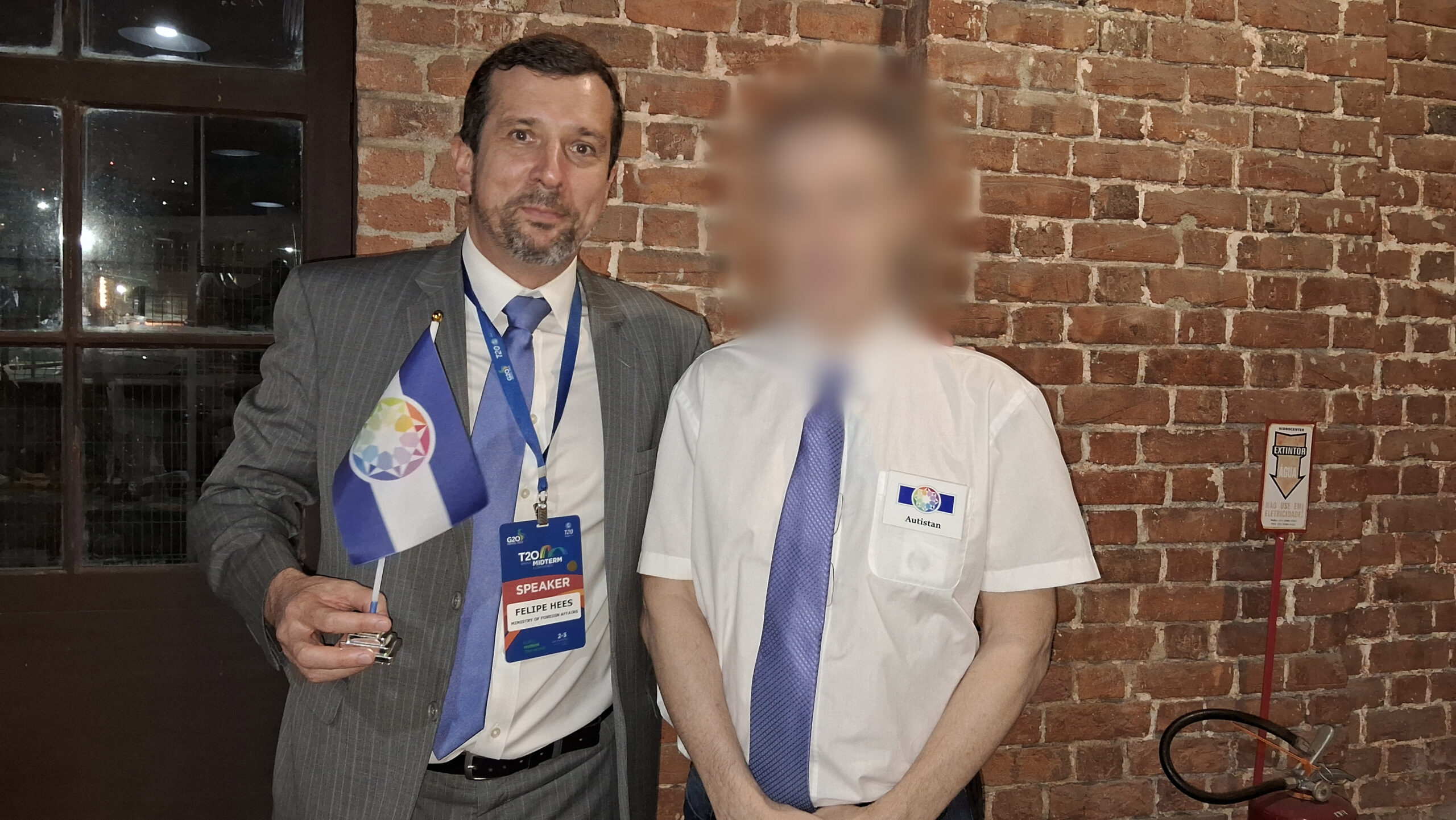 Mr. FELIPE Hees (Sherpa of the Ministry of Foreign Affairs of Brazil / Sub-SHEP for G20 2024) showing the Autistan flag, and a representative of the’Diplomatic organization of Autistan – Objective of anonymization measures: among other reasons, Try to discourage any desire or hope of " shiny autism »As part of our organization.
Mr. FELIPE Hees (Sherpa of the Ministry of Foreign Affairs of Brazil / Sub-SHEP for G20 2024) showing the Autistan flag, and a representative of the’Diplomatic organization of Autistan – Objective of anonymization measures: among other reasons, Try to discourage any desire or hope of " shiny autism »As part of our organization.
The 03/07/2024, We were fortunate to finally obtain a diplomatic dialogue with a member of the Brazilian government, Mr. FELIPE Hees, who is a diplomat representing the Ministry of Foreign Affairs of Brazil as part of the G20 2024.
It is often presented under the title “Minister Felipe Hees“.
We can see below (and other photos Here in the article on our participation in the C20/G20) that this person is one of the three main Brazilian organizers coordinating the meetings and the G20 summit.
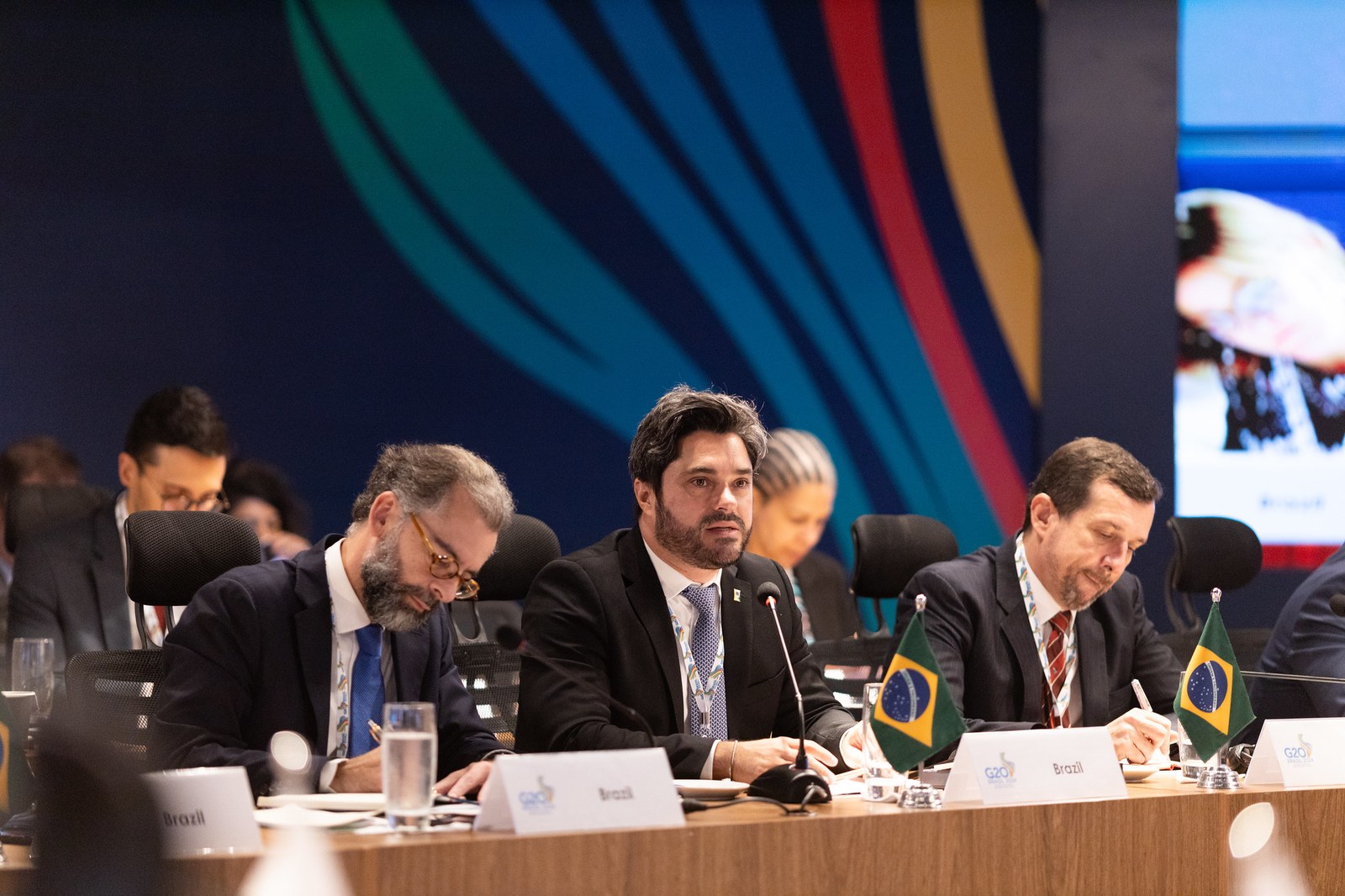
This dialogue was short because unforeseen, but rather instructive and reassuring, As you will see.
In terms of autism, To overcome the many obstacles, You have to make a maximum of very varied experiences and attempts, And there is a “magic word” : the word “to try”.
As with lotteries, If we don't try, We have no chance of success, It is certain to 100%, And unfortunately this is what most parents and autistic people do, Which explains their stagnation, Alas.
When you don't want to change anything, nothing to try again, So do not be surprised if the situations do not evolve.
Once you have understood that you shouldn't be afraid to "take the bull by the horns", So it becomes possible to do almost everything we want.
Being particularly convinced of this principle, So we have tried * to overcome the barrier a priori very high and quite intimidating, who separated us from a man too “important and busy”.
Accessories are often useful, et – in a fairly improvised way – We used the Autistan flag to approach this character between two meetings, at a time when he was not asked by anyone (which was quite difficult to find), And telling him that he is a diplomat and that he knows many countries and flags, But probably not this.
He replied very kindly that he did not know him, Then we obviously explained that this is the “countries of autistic”, summarizing the concept and its main goal (inform the public authorities of the countries so that they better understand the difficulties and needs of autistic, In order to create or improve the necessary public policies).
This gentleman was particularly open, kind, friendly and considerate (For example to hasten to pick up something on the ground), thus showing a behavior really in the antipodes of arrogance and sufficiency of certain “important people” in other countries (especially in Europe).
This benevolent and respectful behavior is also a very common thing in Brazil, highly appreciated, and which in the end of the end makes a very big difference and makes possible many things possible.
What's more, He spoke the French language perfectly, Without the slightest foreign accent, which certainly facilitated things well, in our attempt to expose the essentials without abusing his time, Because we could speak quickly and precisely.
We started by saying carefully that it was amazing and too bad for an important and large country like Brazil, populated by 210 millions of inhabitants, There is no specialized public body in charge of autism at the national level.
We said that even in France, which is a country which is very criticizable in terms of correct consideration of autism, Such an entity has existed since at least 10 ans, And we have given some details because we know her well, specifying that now this organ includes approximately 7 people.
Felipe Hees could only go (And undoubtedly start to realize that we know our subjects).
Then we explained, diplomatically, the important difficulties we encounter in finally establishing a dialogue (A real useful and lasting constructive dialogue) With the public organs of Brazil, especially those theoretically affected by autism, Despite our various attempts, reinforced for two years.
We suggested that he could perhaps “boost” to ensure that certain public bodies give us a little more attention, in order to be able to make a “connexion”.
Because the problem is that when the dialogue is too distant or too superficial, It is not possible to go into details, arguments, Examples and evidence allowing interlocutors to truly understand that what we offer is not only a concept “cool” With a pretty flag, But something truly serious and useful.
For the moment in Brazil, The reactions we obtain remain within the limits of congratulations and politeness or kindness, But without real attention, As if it were unimaginable that autistic people can really bring specific things, concrete and useful to improve public policies in the field.
To our suggestion perhaps help us a little to make a bridge or create the “missing link”, Mr. Hees did not have a reaction, behavior that, in the world of diplomacy, probably means that such a proposal is not really feasible from him, Or at least that he has no immediate response.
And it is true that discussions relating to national public policies in matters of autism have nothing in common with international policy issues, a priori.
However, He told us that he found it interesting to know our existence, and that if necessary in the future, He can talk about it (to colleagues or other government entities, supposedly).
Since he spoke French and that there was not the slightest obstacle or discomfort in the conversation, relaxed and certainly sincere, We have cautiously clarified that our point is not “requests” more, on the contrary, proposals to help.
Since the tone of the conversation was relaxed and friendly (What must be guessing according to the photo), To summarize the difficulties of dialogue with the public authorities, We mentioned the term “Bureaucratistan” In contrast to Autistan, which is very explicit, and m. Hees has nodded, smiling (While in other countries people could have entered by taking this personally).
To avoid any risk, We immediately recalled that this problem exists in all countries, not just in Brazil.
Ensuite, We mentioned, as briefly as possible, The fact that there are really a lot of misunderstandings in the field of autism, and that we do not claim that there are no problems related to autism. This seems obvious, But certain positions of movements such as that of neuro-diversity blur the cards a little.
He replied that yes of course there are problems, and as an example of a misunderstanding, We cited in a very brief way the fact that, in our opinion, It is imperative to make a distinction between “Autism” (as a different nature), et “Autism disorders” (who are, in summary, problematic aspects).
While almost everyone confuses both, and that it is really very difficult to make the difference understand, Felipe Hees immediately understood.
We used the comparison with a nut (People see “Autism” like just a nut “unbreakable” and therefore an immiageable, While it must be understood that nuts are made up of defects or protection (The shell), and good sides (they sifted them, what is nourishing – and tasty).
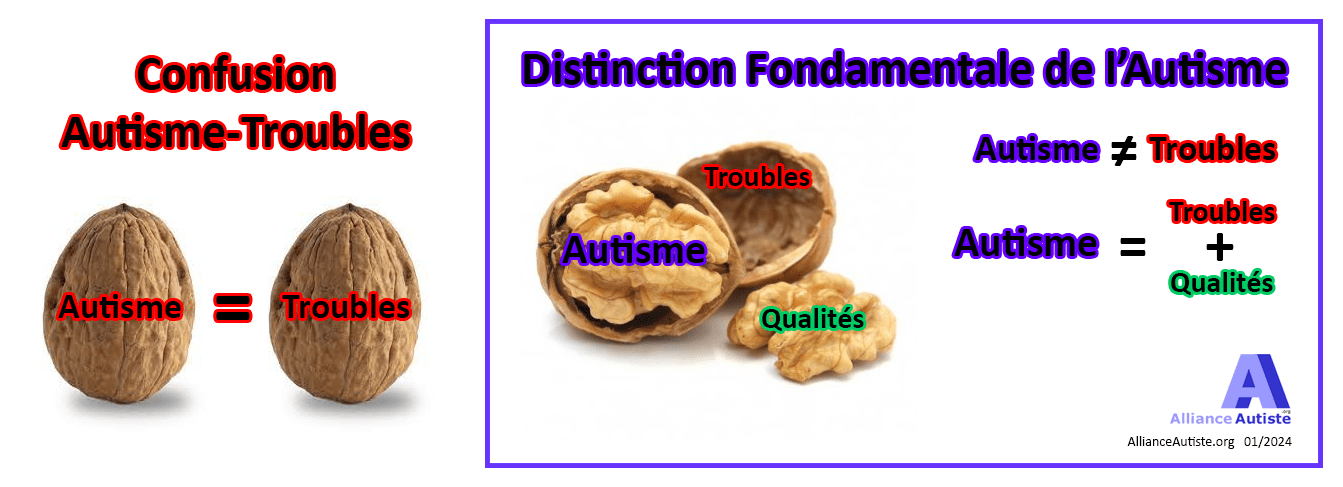
But each of our words there was no need to get into the details because this gentleman seemed to understand everything instantly. Which undoubtedly explains his post.
Since this discussion was happening between two rooms, That is to say between two of the meetings that he co-directed, We didn't want to take him more time, Even if it did not show any sign of impatience or discomfort.
To the end, encouraged by this good atmosphere, The representative of the’Diplomatic organization of Autistan had the idea of asking Mr. Felipe Hees if he accepted a photo (And it should be noted that all of this was really improvised, unprepared).
He immediately accepted with a smile, And he even offered to pose with him in the photo, thing that hadn't even come to the idea.
Then we took leave of this charming man and particularly gifted to understand, even subtle subjects that are not in its field.
This episode may seem quite anecdotal, But thinking about it, It is far from superficial or useless.
Indeed, This shows us that the Brazilian public authorities are not so inaccessible, but above all, This confirms us in the validity of our approach based on the concept of “Parallel diplomacy“.
Selon ChatGPT:
“Parallel diplomacy refers to informal and unofficial communication and negotiation channels which work in parallel with formal diplomatic efforts carried out by governments. It involves non -governmental actors involving dialogues and problem solving efforts to deal with conflicts or strengthen confidence between nations.
Autistan's diplomatic organization (ODA) is an entity representing the interests of the autistic community around the world. She practices parallel diplomacy by pleading for the rights and inclusion of autistic people by dialogue with governments, international organizations and other stakeholders. ODA promotes understanding, acceptance and accommodation of autistic people within the company by non -traditional diplomatic channels, thus contributing to global efforts in favor of inclusiveness and diversity on the international scene.”
That is to say that we act as if we were a foreign country, Or at least we act as an organization (ONG) foreign, in all countries.
So it is understandable that when we approach ministries of this or that country, These can be quite difficult because they are used to dialogue only with entities of their country, and not with foreign organizations that, in addition, are organizations “of autistic people who speak”, and which also offer to help them (All this before appearing a little “like another planet”), While generally it is rather the opposite : Ministries dialogue with parents' organizations, who ask for help.
This is probably why the direct dialogue with the ministries is so difficult.
This brief meeting therefore confirms us in our project to concentrate our efforts on the Ministries of Foreign Affairs and on Embassies, which until now went pretty well (For example with India et With Nepal).
The idea that emerges from all this is that diplomats are used to dialogue with people of very different cultures, And so they are more flexible and less easily disturbed, or even not at all, whatever the subject.
It must be remembered that “Be autistic, It’s a little bit to be “all the time a stranger” (Even in his own country)“.
While the people of the ministries are “What they have to do”, and do not know how to manage proposals that are too far from “what is planned”.
Nowadays, We unfortunately live in a world where what has not already been planned (by someone else) has become almost impossible. And this problem is stronger in large countries, where the weight of bureaucracy is heavier.
In conclusion, We believe it would be useful and probably fruitful to try to dialogue with these services and people “accustomed to foreigners”, in the hope that they can make the link with the national authorities directly concerned, like the public bodies in charge of disability.
The idea is to have at least one to two to two hours with a person from a Ministry of Foreign Affairs, especially in Brazil, so that this person, Even if she is not at all specialized in autism, understands the importance, the relevance and the great usefulness of our explanations and information.
In this way, She could then contact the authorities directly concerned, to ask them to pay us enough attention, so that we can finally, for real, start useful and lasting dialogues in the interest of autistic people and their families.
We, We know very well that we can provide this useful precise information (And we have evidence or convincing examples), But these authorities do not know it and do not doubt it. Even when you insist politely and patiently, That's not enough.
The Ministries of Foreign Affairs could therefore play a role of “mediator”, which more or less corresponds to their function, and what is, exactly, is a necessary thing in the presence of autism.
Luckily, We learned in a meeting of the day before that Brazil has acquired, in each ministry, services dedicated to social participation and diversity.
And it is Monsieur Fabricio Prado, The head of this service for the Ministry of Foreign Affairs, who explained this.
He gave us his card, We sent a brief email and he received a very fast response expressing an interest.
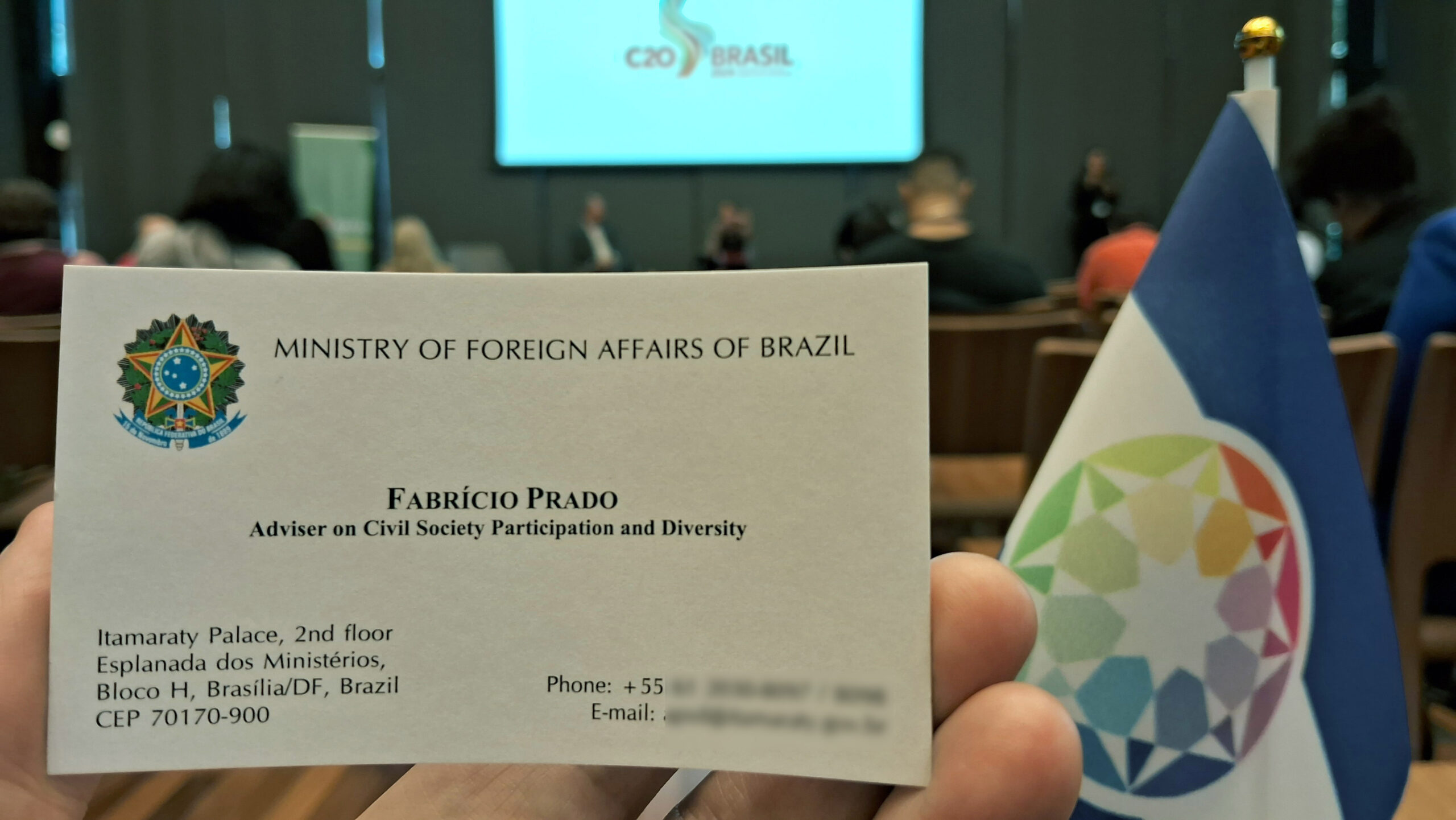
We will prepare a letter for the attention of this service which seems particularly encouraging, in the hope of finally creating a bridge “bouts” Between Autistan and the public bodies concerned by autism in Brazil.


